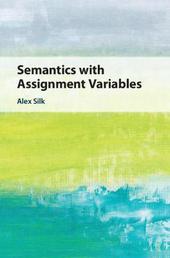
|
Semantics with Assignment Variables
Hardback
Main Details
| Title |
Semantics with Assignment Variables
|
| Authors and Contributors |
By (author) Alex Silk
|
| Physical Properties |
| Format:Hardback | | Pages:280 | | Dimensions(mm): Height 235,Width 158 |
|
| Category/Genre | linguistics
Philosophy of language
Semantics
Grammar and syntax |
|---|
| ISBN/Barcode |
9781108836012
|
| Classifications | Dewey:401.43 |
|---|
| Audience | | Professional & Vocational | |
|---|
| Illustrations |
Worked examples or Exercises
|
|
Publishing Details |
| Publisher |
Cambridge University Press
|
| Imprint |
Cambridge University Press
|
| Publication Date |
24 June 2021 |
| Publication Country |
United Kingdom
|
Description
This pioneering study combines insights from philosophy and linguistics to develop a novel framework for theorizing about linguistic meaning and the role of context in interpretation. A key innovation is to introduce explicit representations of context - assignment variables - in the syntax and semantics of natural language. The proposed theory systematizes a spectrum of 'shifting' phenomena in which the context relevant for interpreting certain expressions depends on features of the linguistic environment. Central applications include local and non-local contextual dependencies with quantifiers, attitude ascriptions, conditionals, questions, and relativization. The result is an innovative philosophically informed compositional semantics compatible with the truth-conditional paradigm. At the forefront of contemporary interdisciplinary research into meaning and communication, Semantics with Assignment Variables is essential reading for researchers and students in a diverse range of fields.
Author Biography
Alex Silk is a Senior Lecturer in Philosophy at the University of Birmingham and the author of Discourse Contextualism. He has earned international recognition for research in philosophy of language, normative theory, and linguistic semantics. He is the recipient of the Sanders Prize in Metaethics and grants from the Arts & Humanities Research Council and Leverhulme Foundation.
|